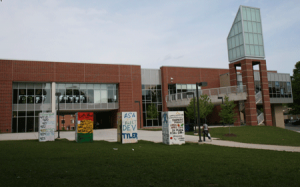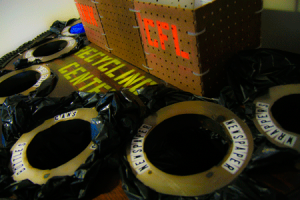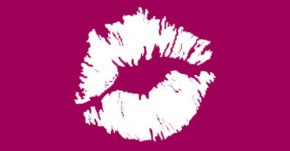 BY NOW, WE all understand the responsibility we have to do what we can to reduce our impact on the environment. At college campuses across the country, students, faculty and staff are participating in a variety of greening efforts. George Mason University is high on that list of schools on their way to being a sustainable university. From dining facilities to recycling donation programs, Mason provides students with numerous ways to get involved and live the green life.
BY NOW, WE all understand the responsibility we have to do what we can to reduce our impact on the environment. At college campuses across the country, students, faculty and staff are participating in a variety of greening efforts. George Mason University is high on that list of schools on their way to being a sustainable university. From dining facilities to recycling donation programs, Mason provides students with numerous ways to get involved and live the green life.
You’ve probably already heard about Southside, Mason’s sustainable dining facility. Located in the Chesapeake Area, Southside opened on Oct. 6, 2008 and has since become a popular hangout for students, particularly freshmen and sophomores. It features six dining stations and everything from sandwiches and burgers to cupcakes and cookies. Unlike other dining areas on campus, Southside uses a trayless system in order to help students reduce the amount of food they consume and a composting machine called a pulper churns waste into pulp to reduce waste and save energy. As part of sustainability efforts on campus, Mason uses biodegradable plasticware made from corn-based and recycled materials in Gold Rush, the grab-and-go shop on the lower level of Southside. Like with Southside, Mason is being conscious of the impact new building projects will have on the environment. New buildings on campus are being designed and built to meet a minimum of the Leadership in Energy and Environmental Design (LEED) Silver standard.
The latest sustainable effort to come to Mason is the Farmer’s Market. Sponsored by University Services, the market arrived in May of this year and is scheduled to remain on campus and be held in the Johnson Center North Plaza until October. Every Wednesday from 11:30 a.m. to 3:30 p.m., you can visit any of the vendors at the market and purchase a variety of locally grown products ranging from bread and baked goods to fresh milk and eggs. From now until Aug. 19, the market will be held on Wednesdays in Lot K from 11:30 a.m. to 3:30 p.m. and will return to the JC North Plaza in time for the start of classes.
The Patriot Green Fund is another new sustainability endeavor by the university that is intended to support environmental initiatives at Mason. The money for the fund will come from a student fee every semester of $5 per full-time student and $2 per part-time student. Potentially, the fund could pay for the installation of solar panels on campus buildings, additional recycling bins, or a campus farm.

Recycling what you use on campus is a really easy and effective way to do your part in the campus greening revolution. You can recycle a number of materials including glass, steel, aluminum, plastics #1 and #2, white paper, mixed paper (receipts, cereal boxes, glossy mail inserts, etc), cardboard and newspaper. Wrappers, plastic grocery bags, and Compact Fluorescent Light Bulbs, or CFL’s, can be left at the recycling center in the Northern Neck residence hall. Old cell phones and dead rechargeable batteries can be recycled at the JC and Student Union Building II information desks. Ink cartridges can be recycled at Patriot Computers in the JC.
In an effort to reduce the amount of water cups used, Mason created two greening bottles, one for cold liquid and one for hot beverages. The Mason reusable green bottles are $5 and can be purchased at the convenience stores Patriot Express and One Stop Shop on campus. The bottles can be refilled with water or soda at any drink station on campus.
The Office of Sustainability, University Services and groups like GMU Environmental Awareness are the first names students think of when they hear the words “green” and “Mason,” but several offices on campus are doing their part to contribute. One example is the Office of Housing and Residence Life, which has made sustainability a priority with their involvement in a few green programs on campus. Their Greening Group has helped increase interest in University President Alan Merten’s Climate Commitment initiative, which demonstrates a pursuit of climate neutrality. OHRL also held Mason’s first energy challenge competition between residence halls Amherst and Brunswick. The goal of the competition was to reduce per-person electricity consumption and encourage students to be more environmentally aware.
A popular recycling program provided by the university is Patriot Pack Out. During the last week of each school year, students can donate unwanted clothing, electronics, working appliances and nonperishable food that will then be donated to local nonprofit groups in the area. In Climate Culture’s contest to determine America’s Greenest Campus, Mason is in second place with 1554 members as of Jun. 2. The contest is the first nationwide contest among colleges to reduce the carbon footprints of their students, faculty, alumni and staff. Students can register with their school e-mail address and have their carbon reductions count towards their university. The winning school has a chance to win up to $20,000 to green our campus. To get involved, you can log on to www.climateculture.com/americas_greenest_campus and register.
As a new Mason student, you’ll be expected to carry on the torch and pitch in to help Mason become a greener place. Take little steps to cut down on your carbon footprint. Remember, no matter how small, every action makes a difference when many individuals make the same decision.




Leave a Reply